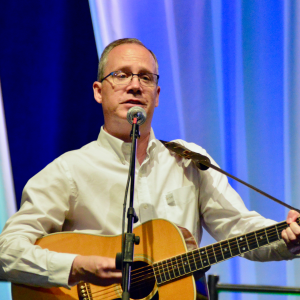 A worship leader at Wild Goose
A worship leader at Wild GooseAs I read through my morning email, this headline caught my eye: “Ruffled feathers: Wild Goose Festival is a case study in how hard it is to disentangle from white supremacy — even when you want to.” The article isn’t really about white supremacy–at least, not the confederate-flag-waving kind.
The Wild Goose Festival is a kind of “Burning Man” for progressive Christians. And, like most things associated with progressive Christianity, it is remarkably white.
Black and Hispanic Christians, progressive or evangelical, have their own churches, of course. They don’t need a Wild Goose Festival as bad as some of us white progressives do. But, measured on the diversity scale, your average white megachurch scores better than your average progressive white congregation.
One reason is music and worship style. Megachurch worship is pop music without the suggestive lyrics. White progressives are drawn to classical music (my congregation is like that), traditional hymns to organ-piano accompaniment, an amateur-hour version of praise music (megachurches used paid professionals), or, all too often, an unsatisfying mix of all of the above that satisfies no one.
Black churches, famously, have a distinctive musical style that no white congregation can replicate. But many Black Christians are willing to settle for the contemporary Christian music found in white megachurches. It’s not what they are used to hearing in church, but it sounds a lot like the stuff on the radio, so it isn’t alien, either.
But this goes deeper than music. Most white progressives aren’t religious, so they don’t attend church; most Black and Hispanic progressives do. This creates problems for the Democratic Party. People of Color tend to support liberal political parties because, since the 1970s, Republicans have used racial animus to animate the base. People of Color, for some reason, find this off putting.
Black Democrats tend to be progressive politically and conservative theologically. Black evangelicalism has entered into a marriage of convenience with progressive politics; white evangelicalism has sold out, root and branch, to the Republican Party.
And this explains a lot about white progressive Christians. We want to separate ourselves, as much as humanly possible, from white evangelicalism. If they like contemporary Christian music, we hate it. If they are joined at the hip with the Republicans; we side with the radical wing of the Democratic Party. In other words, the whole game is driven by a rejection of white identity politics and religion. Religiously speaking, we know exactly what we are against and can expostulate on the subject for hours. But our positive religious commitments can be summed up in one word: inclusion.
We love inclusion; we hate exclusion. Our God loves everybody. All the time. Without exception. Beyond that, we have little to say.
If you are a white progressive Christian, you are likely thinking, “and that’s a problem because . . .?”
But if you are a Black or Hispanic Christian, you probably want more. Sure, you are tired of being excluded. You’re glad we progressive Christian types are inclusive. That’s great. But is that all?
Is there no call to transformation (apart from becoming more and more inclusive)? What is the answer to gun violence? What is our advice for young kids who are drawn to the streets? What is our response to teen pregnancy? What’s our stand on the epidemic of drug addiction? What’s our answer to police violence? What do we say to young adults who blow what little money they have on entertainment?
Progressive Christians find most of these questions offensive. At core, we are radical individualists. It’s not our job to tell other people how to live their lives, we say.
But if you walk into a Black or Hispanic church, these questions are typically front and center. The preacher tells you exactly how to think, and how not to think about the make-or-break issues facing the community.
White progressives, for the most part, are highly educated and hail from the suburban bubble. It’s possible that we have wrestled with some of the existential issues mentioned above; but we probably haven’t.
When Christians of color attend a progressive Christian worship service, they probably won’t be offended. A few may even be inspired (no racial group is monolithic, after all). But most will smile, shrug and return to a church that addresses the questions they care about.
Having said all that, I must confess my ignorance. I know a lot more about progressive Christian theology and Black church life than most white folks; but that isn’t saying much. So, if I’ve completely missed the ball, set me straight. I’d love to hear from you.
